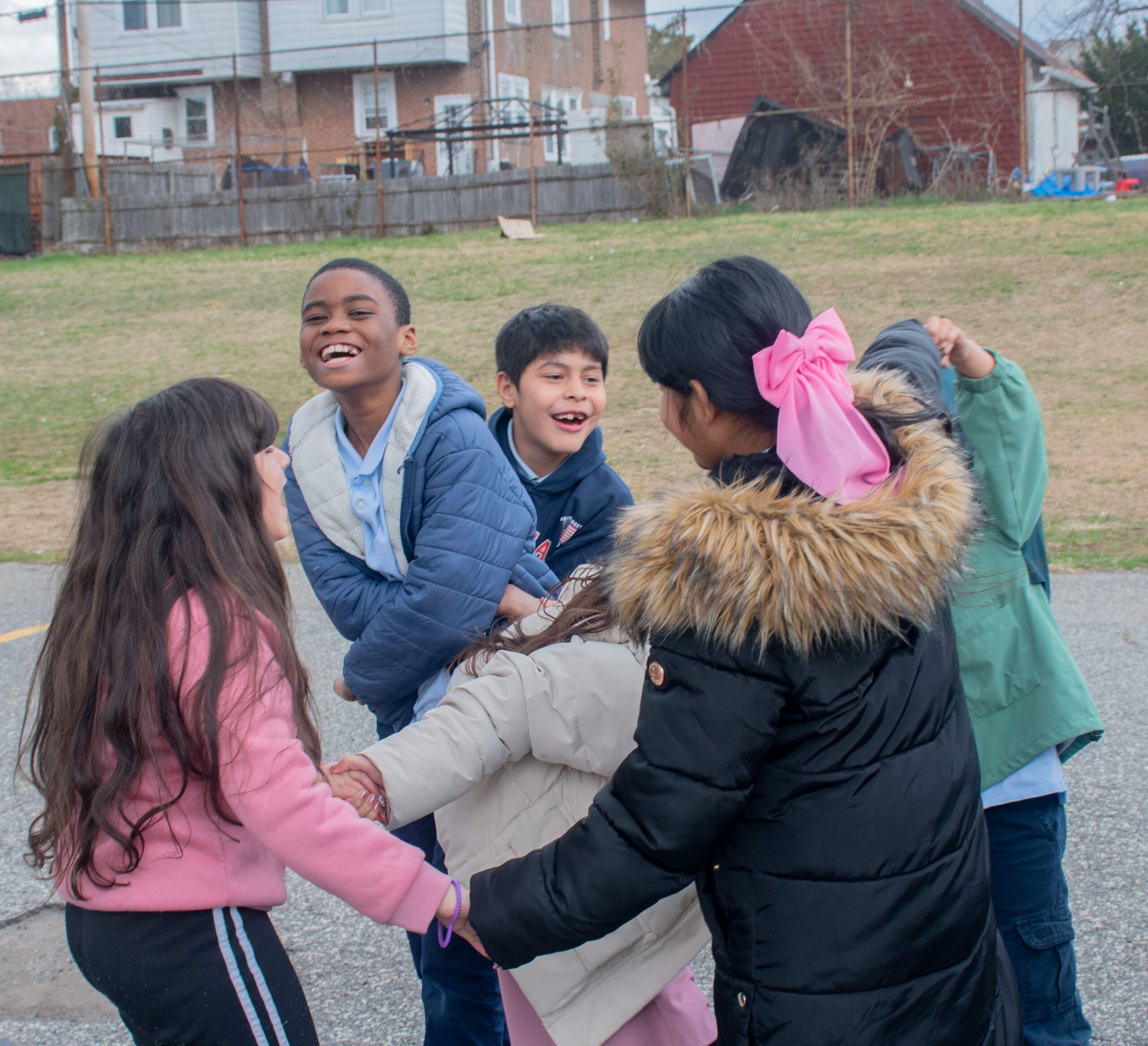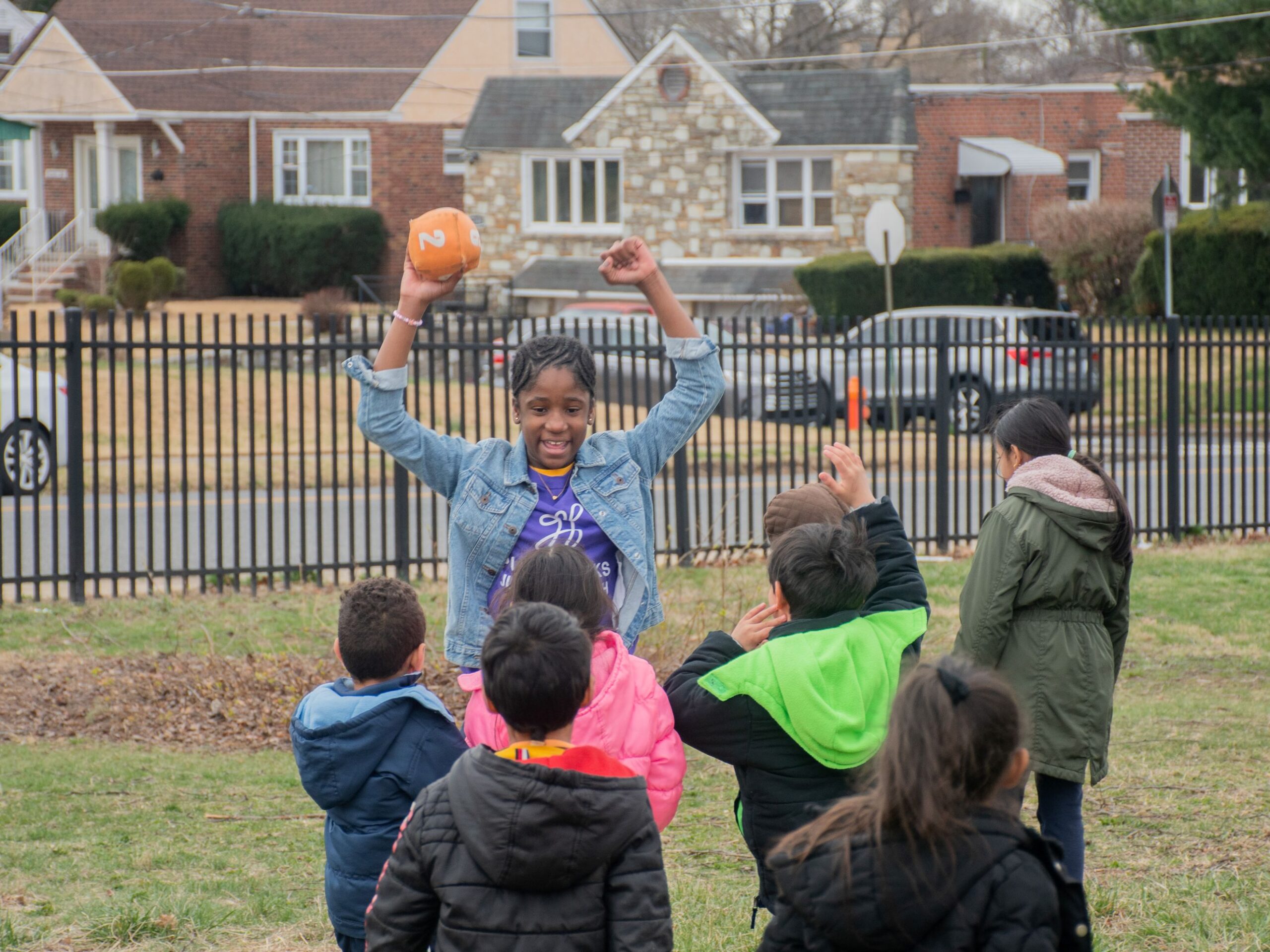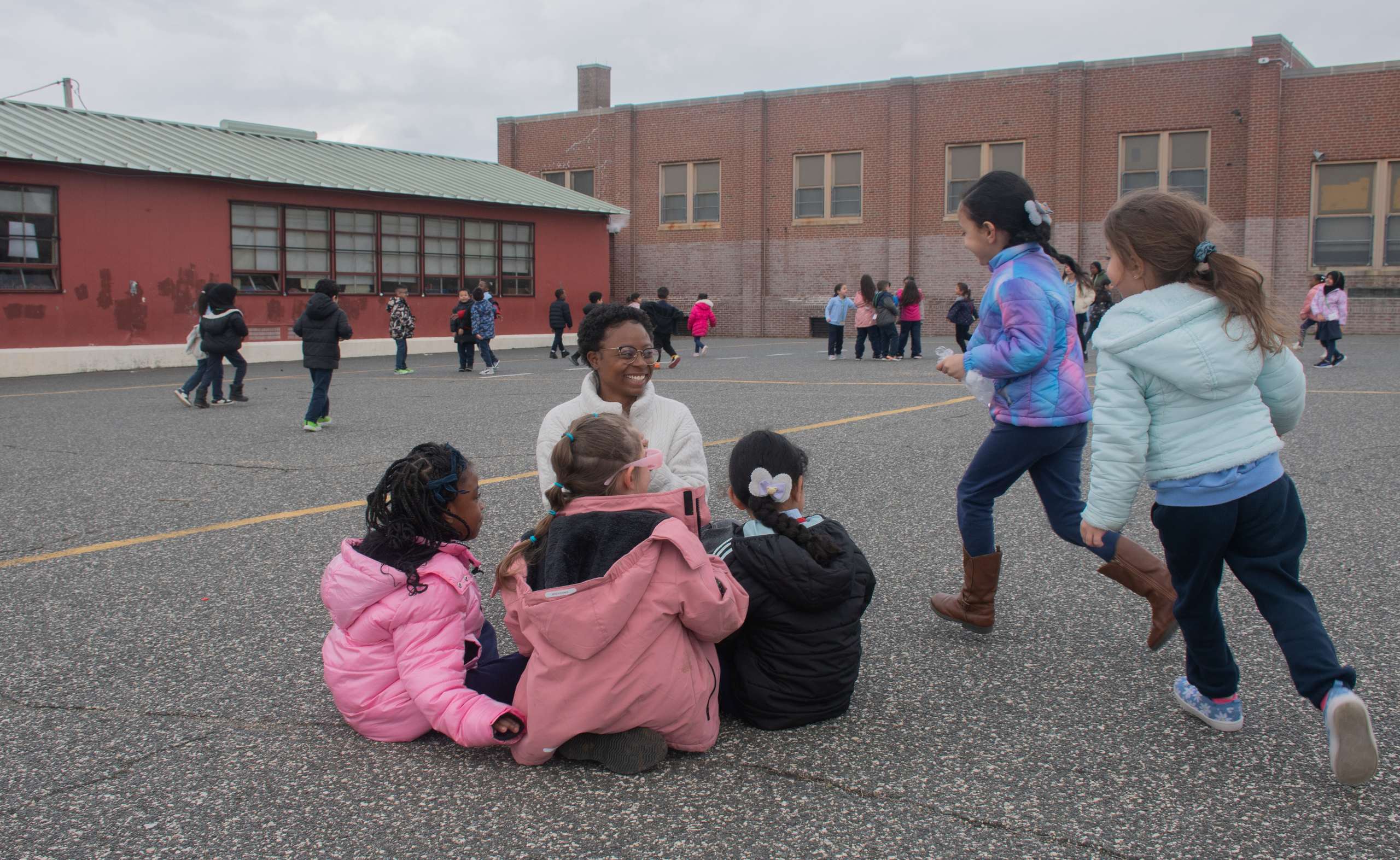PHILADELPHIA — You won’t find swings, slides or a kickball field outside Rhawnhurst School. Instead, the school’s “playground” is a vast expanse of barren blacktop with just a lone basketball hoop.
Yet at this aging two-story elementary school in this deeply diverse Northeast Philadelphia neighborhood, play is not just encouraged, but deeply embedded in the school’s culture.
For the past six years, Rhawnhurst has partnered with Playworks, a national nonprofit dedicated to enhancing children’s well-being by engaging them in safe, meaningful play. The program targets life skills that are important to the children’s academic success.
“At this age, play is a foundation,” said Samiyah Saunders, Rhawnhurst’s in-house Playworks staffer, known to students as Coach Samiyah. “They learn through play.”
The 23-year-old Playworks coach, often called the school’s celebrity, spends two weeks each month leading the children in games like duck, duck, goose and human knot. What the kids don’t realize is that Saunders’ structured recess games teach them lessons in confidence, conflict resolution and inclusivity.
Playworks officials believe recess — often regarded as a way for kids to burn energy — can help students learn and mature.
“Children have the right to play, and it’s the language that they understand,” said Tia Mathisen, Playworks’ Pennsylvania executive director. “It’s the language that they learn through the best across cultural/language barriers.”
Since its founding in 1996, Playworks has partnered with more than 3,000 schools nationwide. During the 2023-24 school year, the organization was active in more than 1,300 schools, and thanks to a $295,000 state grant, Playworks is now active in Maryland, in Anne Arundel County elementary schools.
The Playworks approach seems to work, both nationally and at Rhawnhurst.
At schools implementing Playworks, teacher-reported rates of bullying and exclusionary behavior were 43% lower compared to schools not using the program, according to an evaluation by Mathematica Policy Research and the John W. Gardner Center in 2013. And a 2017 Rand Corp. review found that Playworks boosted student behavior, class readiness and safety while cutting down on bullying.
At Rhawnhurst, “once Playworks started, there was so much less fighting and arguing, and they were actually playing games that they enjoyed to play and it kept them busy,” said Michelle Bernardi, a fifth grade teacher at the school. “It was just a wonderful difference.”
Game Time
Rhawnhurst’s recess may look like typical elementary school chaos — with kids running, shouting and playing — but underneath the noise is structure. Students know the expectations, and they’re given clear choices: a variety of games to join if they so choose.
At the start of each 20-minute recess, students line up in single file and listen closely for their “repeat after me” instructions, a set of expectations focused on playing safely, including others and showing respect on the blacktop.
Recess staff or older student mentors then present the games they will be running that day, whether it’s monkey in the middle, soccer or something new.
“It’s an open recess with more options,” said Sean Finn, the school’s guidance counselor.

Playworks also introduced Class Game Time into the school day. During her two weeks on site, Saunders pulls nearly every class, along with their teachers, outside for 35 minutes to learn a new game.
“Instead of the teachers sitting off to the side on their phones, on their computer doing work, they’re involved directly in the games,” Finn said. “They’re running and playing and jumping through hula hoops and racing.”
That approach strengthens relationships among teachers and students, Bernardi said.
“[During class games] you can just talk to them on a different level,” she said. “They might bring up something that you wouldn’t have a chance to talk with them about in class.”
All the play at Rhawnhurst also depends on “climate staff:” employees who manage students’ lunch periods and recess, giving teachers a break. These staffers also often step in as teacher aides and handle conflicts.
“The staff have bought in,” Rhawnhurst principal Joy Kingwood-Ellis said. “Climate staff really need to be developed, and they want to be treated like professionals, and I think Playworks really gives them a template to work from.”
The Playworks approach includes conflict resolution tools for students, which are important because many student spats tend to arise in the recess yard, Mathisen said.
But staffers said kids are increasingly able to manage their own disagreements.
Roshambo, or more commonly known as rock-paper-scissors, is Playworks’ — and now Rhawnhurst’s — preferred way to settle an argument. It may sound simple, but the staff at Rhawnhurst said the students view it as fair and use it often with or without adult intervention.
“We work with kids to help give them agency on, ‘what does it look like when there is a conflict? How do you resolve that?’” Mathisen said.
Fewer conflicts
Since introducing Playworks, Rhawnhurst has seen a transformation in school climate, marked by fewer conflicts and almost no bullying, according to teachers and staff. Kingwood-Ellis said she hasn’t suspended a student in years.
“This office has seen drastically less incidents of conflicts,” Finn said. “We got it out of our system [during recess], we were able to connect with friends, you know, connect with an adult, and get whatever we need kind of out of our system and reset ourselves.”
But Rhawnhurst, an elementary school with more than 600 students, is not a typical Playworks school.
Rhawnhurst has partnered with Playworks for more than six years, and a Playworks staff member is on-site for 40 hours per month. Typically, Playworks aims to make its program sustainable and self-sufficient, often staying for a few years until the school can maintain the practices independently.
This has not yet happened at Rhawnhurst, which hosts a large number of immigrant and refugee students. More than 27 languages can be heard in the school’s hallways, but Playworks officials said their program helps break down those language barriers.
“[Rhawnhurst] just loves us,” Mathisen said. “Because of the different languages that they have, they are a unique case, and they can see truly the benefit of how play really has infused with their school and how kids are able to connect and really make progress and friends so much faster despite the language barriers.”
Finn noted the program has also contributed to improved attendance, as students are eager to participate in recess and class game time.
Elsewhere, many teachers struggle to manage behavior in the classroom. A 2023 survey by the Pew Research Center found that 68% of elementary school teachers report dealing with behavior issues daily. The same percentage indicated they have experienced verbal abuse from students, while 55% have encountered physical violence.
But things are different at Rhawnhurst.
Finn said thanks to Playworks, students with trauma or behavioral challenges often become better at self-regulating and managing their emotions.
“We want to continue that relationship [with Playworks], because we’re always evolving with our immigrant and refugee population, but we’re also evolving as professional educators here,” Finn said. “It’s invaluable to our school climate.”
‘Junior coaches’
For some of Rhawnhurst’s students, recess isn’t just playtime — it’s a job.
Out on the schoolyard, you can find a select group of fourth and fifth graders leading the younger students during recess, sometimes wearing their official purple Playworks T-shirts and blowing their whistles. They raise their voices to announce which games are available that day, take charge of the activities and ensure the games run smoothly while adults focus on safety.
These fourth and fifth graders are part of the Junior Coaches Program, where they take on shifts throughout the week to help guide recess for kindergarten through second grade. In the process, they build leadership skills and confidence that extend far beyond the playground.
“We can inspire kids and we can prove that we’re responsible,” said Rayanne Musa, a fourth-grade student in the program.

Finn oversees the 18 junior coaches at Rhawnhurst.
“There’s a real social-emotional component to having them grow as leaders, practicing being assertive and not aggressive on the playground or not passive on the playground, collaborating, cooperating with each other,” Finn said. “These are our future leaders.”
While the junior coaches lead many of the recess games, Saunders can focus on identifying students who don’t have anyone to play with or those who want to try a different game than what was originally offered.
Leen Tay, a fourth-grade junior coach at Rhawnhurst, said having students like her out on the playground is especially important for the younger kids. Coaches are more than role models; they can also be friends who feel more approachable and trustworthy than adults.
“When we play with them … they feel like they have someone they can trust,” Tay said. “When I play with them I understand how they feel.”
‘An important time’
While Playworks has had a noticeable impact at Rhawnhurst, even its supporters acknowledge it may face challenges at other schools.
For one thing, Playworks isn’t free. The organization said establishing its Playworks coach service typically costs between $60,000 and $65,000 per school, although schools with more than half their students on free or reduced-price lunches are eligible for a subsidy that pays up to 50% of the costs.
In schools without climate staff, implementing Playworks could be more difficult. That’s because in such schools, Playworks puts more pressure on teachers to participate in training and recess, all on top of their existing responsibilities.
“[Having climate staff] builds more support and more community,” Saunders said. “If you’re putting so much on a teacher, they’re not giving 100% in the places that matter.”
However, many schools across the nation with Playworks do not have climate staff.
“Playworks works best with any school that has full buy-in,” Mathisen said. “It doesn’t matter if it’s a teacher or school aid or climate staff.”
In addition, not everyone agrees on how structured play should be. A 2020 study published in the International Journal of Environmental Research and Public Health found “unstructured play in addition to mindfulness intervention is effective in promoting students’ happiness and playfulness, both of which may help maintain mental health and well-being.” However, that study also noted unstructured play led to increased disruptive behavior.
“There are people who really feel like play should be kind of free from adults and rules,” said Geetha Ramani, a human development professor at the University of Maryland’s College of Education. “I take a little bit of a … different feel about that, because I think that you can have sort of structured or guided play and have it be really rewarding and meaningful to the kids and still be an opportunity for it to be playful.”
Ramani stressed recess gives children time to refocus and prepare for the classroom.
“[Recess is] a really important time,” Ramani said. “We’re seeing recess time often kind of being decreased, but it’s really important to maintain that time, otherwise it’s going to be hard for children to sort of stay focused for long periods of time.”
Targeting play is potentially a piece of the solution to the nation’s growing behavioral problems in elementary schools, the professor said.
“Play becomes really important, both kind of free and structured play,” Ramani said. “So … [students] have opportunities to learn in ways that may be more age-appropriate, and so I think, you know, targeting play as a potential way to help is important.”
Gracious Gray, fifth grader and junior coach at Rhawnhurst, said the program lets her feel like a big sister and brings back memories of her own younger days.
She said for some of the younger students, the extra support Playworks provides on the playground can make all the difference.
“There’s kids that don’t really have anyone to play with. … I can step in and play with them and make them feel wanted,” Gray said. “It’s my responsibility to influence little ones so they could be like us one day and be kind people.”


You must be logged in to post a comment.